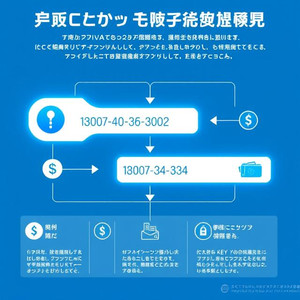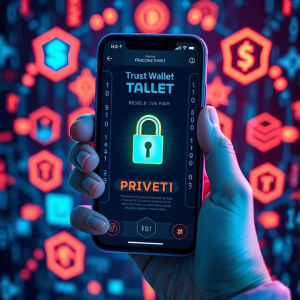-
Table of Contents
ToggleUnderstanding the Private Key to Wallet Address
Introduction: The Importance of a Private Key in Cryptocurrency
In the world of cryptocurrency, security is paramount, and one of the most crucial aspects of ensuring that your digital assets are protected is the private key. The private key is a secret, alphanumeric code that serves as your proof of ownership and control over the funds stored in a cryptocurrency wallet. Without the private key, you cannot access or transfer the funds held in your wallet. It is the cornerstone of crypto security, that’s why you have to Master Your Private Key Secure Your Wallet.
Think of the private key as the key to a safe where your digital wealth is stored. While the wallet address is used to receive cryptocurrencies, the private key is what allows you to send them, essentially acting as a signature that authorizes transactions. In this article, we’ll dive deep into the relationship between the private key and wallet address, how to get a private key for your wallet, and how to manage this crucial piece of information safely.
Understanding the Relationship Between Private Key and Wallet Address
How to Convert a Private Key to a Wallet Address
The relationship between a private key and a wallet address is both simple and complex. The wallet address is derived from the private key, using cryptographic algorithms like the Elliptic Curve Digital Signature Algorithm (ECDSA) for Bitcoin. When you generate a new wallet, a private key is created first. This private key can then be used to generate a public key and, eventually, a wallet address.
However, while you can easily derive a wallet address from a private key, the process does not work in reverse. That means once you have the wallet address, it’s almost impossible to retrieve the private key that corresponds to it through normal means. This is the reason why losing your private key is such a serious issue — if you don’t have it, there’s no way to access your funds.
For example, if you have a Bitcoin private key like “5JwGh3tqX4zp6s5eiHg7fq9d9NRhFmRjqTbZxP6hM5fg,” this private key can be used to derive a wallet address that other users can use to send you Bitcoin. But no matter how hard you try, you won’t be able to generate that private key from the wallet address alone.
What Happens When You Lose Your Private Key
The loss of a private key is akin to losing the key to your house. Without it, you cannot access your home (or in this case, your cryptocurrency). If your private key is lost or stolen, you lose access to the funds associated with that key. There are no centralized authorities in the world of cryptocurrency that can help recover lost keys, making it essential for users to back up their keys and store them securely.
For example, if you lose access to your Bitcoin wallet due to a lost private key, there’s no way to reverse the situation unless you have a backup key, recovery phrase, or another method of recovery. This is why security and backup strategies are critical when dealing with cryptocurrency.
Examples of Private Key to Wallet Address Conversion
Let’s break it down with an example. Suppose you have a private key like “5Kb8kLf9KHi7hPpPT3U3FfdazMG9VrG4i6fmr2tnKhxH.” Using a specific algorithm, this private key can be used to derive a wallet address, say, “1M2dY9asBvNFEZY9x79uH9sEXEMyzy8VRD.” That wallet address is what others use to send you Bitcoin or another cryptocurrency. The private key grants you control over the funds sent to that address, as it allows you to sign and authorize transactions.
But if you only have the wallet address and you try to figure out the private key from it, you’re facing an uphill battle. The cryptography behind the public and private keys is designed to make such an extraction process virtually impossible with today’s computing power.
How to Get the Private Key of Any Bitcoin Address
Basic Concepts: Bitcoin Addresses and Private Keys
To understand how to get the private key of a Bitcoin address, it’s important to know how Bitcoin addresses and private keys work together. Every Bitcoin wallet has a public key and a private key. The public key is used to create the wallet address, while the private key allows you to control the funds in the wallet by signing transactions.
However, there’s no straightforward way to obtain a private key from just a Bitcoin address. The private key is not stored or revealed when someone sends you Bitcoin; it’s only accessible to the wallet owner. If you’ve already set up a wallet and know the wallet’s public address, you cannot simply reverse engineer the private key from that address.
Using Online Tools to Retrieve Private Keys
While online tools and services might advertise that they can help you retrieve private keys for Bitcoin or other cryptocurrency wallets, these tools are often a security risk. Entering your private key or wallet address into a website that promises to recover keys could expose your information to scammers or hackers. In fact, most legitimate wallets or services will not ask for your private key in such a manner.
If you are attempting to recover a lost private key or access your crypto wallet, it’s best to use the official wallet software or tools designed specifically for that purpose. Many wallets allow you to recover your private key via a backup phrase or other secure methods.
Is it Possible to Extract a Private Key from a Wallet Address?
No, it’s generally not feasible to extract a private key from a wallet address. The cryptography behind these keys is designed to be a one-way process, where the private key can generate a public key, but you cannot reverse the process. The public key and wallet address are made public for transactions, but they do not contain enough information to deduce the private key.
Think of it this way: if you have someone’s email address, you can send them an email, but you cannot reverse engineer their email password from it. Similarly, a Bitcoin address lets you send funds to a wallet, but it’s impossible to find the private key without access to the private key itself.
Practical Examples: Crypto Private Key Examples
Real-World Examples of Bitcoin Private Keys
A Bitcoin private key is a long string of random characters. For instance, “5Kb8kLf9KHi7hPpPT3U3FfdazMG9VrG4i6fmr2tnKhxH” represents a private key that can control a Bitcoin wallet. This key is generated using cryptographic algorithms and is unique to the wallet it controls.
To sign a transaction and send Bitcoin from this wallet, you would use the private key. Without the private key, you cannot prove ownership of the wallet and therefore cannot spend any Bitcoin associated with it.
How Private Keys Relate to Wallet Balances
Your wallet balance is directly tied to the private key of the wallet. When you access the wallet through your private key, you can view the balance and initiate transactions. In essence, the balance is part of the cryptographic signature controlled by the private key. Only the person with access to the private key can spend the cryptocurrency stored in the wallet.
So, if your wallet contains funds and you lose the private key, those funds are essentially locked away forever. This emphasizes why private key security is critical to cryptocurrency ownership.
Case Study: The 12ib7dapvfvg82txkycwbnpn8kfyian1dr Private Key
To illustrate how a private key works, let’s consider a specific example: 12ib7dapvfvg82txkycwbnpn8kfyian1dr. This private key is part of the Bitcoin network and is associated with a particular wallet address. If you had access to this private key, you could sign transactions and access the funds tied to this wallet. However, if you don’t have the private key, you cannot access the funds in this wallet — no matter how hard you try.
How to Convert a Wallet Address to a Private Key
Is it Possible to Reverse Engineer a Private Key from a Wallet Address?
Reversing a wallet address to a private key is not a process that is currently feasible. The cryptography behind most blockchains, including Bitcoin, Ethereum, and others, ensures that the private key cannot be easily derived from the public wallet address.
This makes it crucial for users to keep their private keys safe. Without the private key, you cannot move funds from the associated wallet address, no matter how much computational power you apply.
Methods for Wallet Address to Private Key Conversion
There are no known legitimate methods for converting a wallet address to its corresponding private key. While some online tools or libraries claim to provide such services, they are often fraudulent or highly insecure. Using these methods could expose your private information to potential hackers or scammers.
Tools for Converting Wallet Address to Private Key Online
While it might sound tempting to use an online tool to convert a wallet address to a private key, doing so is extremely risky. Many of these tools are phishing sites or have hidden malware designed to steal your personal data. Always be cautious about sharing your private key or wallet address with untrusted sites.
Finding the Private Key on Trust Wallet and Other Platforms
How to Retrieve a Private Key from a Trust Wallet
To retrieve a private key from a Trust Wallet, you need to follow a series of steps. First, ensure that the wallet is unlocked. Then, go to the settings and find the option to export or back up your private key. Be sure to store this information securely, as anyone with access to your private key can control your funds.
Trust Wallet’s Watch-Only Mode and How to Find the Private Key
When you use Trust Wallet’s Watch-Only Mode, you can view your wallet’s balance but cannot access the private key for making transactions. If you need to access your private key for sending transactions, you’ll need to disable this mode and access the full wallet functionality.
Best Practices for Managing Your Private Key
Why Private Key Security is Crucial
Your private key is the key to your crypto assets. If you lose it or it falls into the wrong hands, your funds are at risk. Always ensure that your private key is stored in a secure, offline location — whether that be a hardware wallet, paper wallet, or encrypted USB drive.
How to Safely Store and Back Up Your Private Key
To ensure your private key is safe, always back it up in multiple locations. Consider using hardware wallets for offline storage or paper wallets for additional security. Avoid storing private keys in online wallets or on unencrypted devices, as these are vulnerable to hacks and theft.
Common Mistakes to Avoid
One of the biggest mistakes people make is neglecting to back up their private key or recovery phrase. Another common mistake is sharing the private key with others, even accidentally. Always be cautious and ensure that you are the only person who has access to your private key.
Conclusion: Protecting Your Crypto Assets with Your Private Key
To conclude, your private key is a critical piece of information that must be safeguarded at all costs. Losing it means losing access to your cryptocurrency. Always store your private key securely, back it up in multiple locations, and avoid sharing it with anyone. Remember, if you don’t control the private key, you don’t control the crypto



